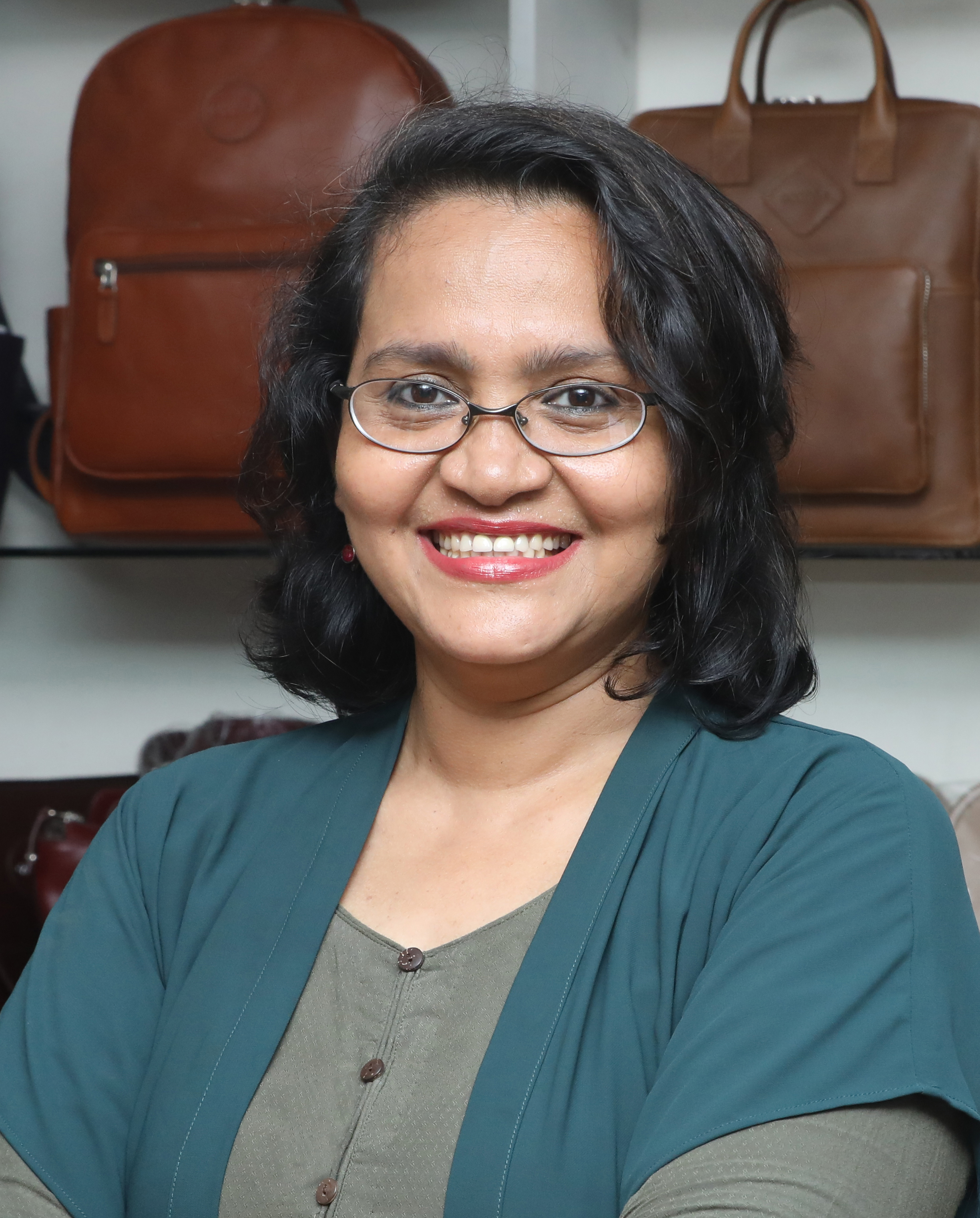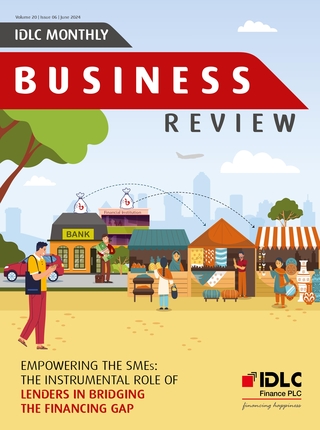
Leatherina
Taslima Miji, Founder and Managing Director, Leatherina
Interviewed By Akhlaqur Rahman Sachee, Team MBR
Ms. Taslima Miji is the founder of Leatherina, a sustainable leather goods manufacturer and exporter. She embarked on her journey in the leather industry back in 2016 out of her passion for crafting artisanal lifestyle products. Her collaboration with the sustainable Dutch brand MYoMY served as a catalyst for her career to evolve as a sustainable manufacturer in the fashion industry. This partnership influenced her to dive into an enduring journey to a sustainable fashion industry ecosystem. Ms. Miji is a passionate advocate for a more responsible and accountable fashion industry, with a deep focus on gender equity and social inclusion. Her pioneering ‘Mission Zero Waste’ project within her business exemplifies her commitment to promoting responsible consumption throughout the production process. Her startup, Leatherina, is a member of Leathergoods and Footwear Manufacturers & Exporters Association of Bangladesh. Team MBR was in a conversation with the founder and managing director of Leatherina, Ms. Miji, and learned about the inspirations behind Leatherina and her aspirations for the startup.
Akhlaqur Rahman Sachee: Established in 2016, Leatherina is a sustainable leather goods manufacturer that prioritises SDG 5, SDG 10, and SDG 12. Would you kindly share with us how you came up with the idea to form Leatherina?
Taslima Miji: It is no secret that the fashion industry contributes significantly to global environmental pollution. As a part of addressing this issue, Leatherina puts emphasis on building a responsible supply chain. Growing up as a woman, I faced patriarchal obstacles, and I see similar discrimination against women in the fashion industry. It developed a sense of responsibility in me to be a changemaker in the industry by taking action through my work. My company, Leatherina, is dedicated to adhering to the United Nations Sustainable Development Goals. As a sustainable company, we attempt to make meaningful contributions to these goals.
Akhlaqur Rahman Sachee: You have academic qualifications in print media, media studies, and sociology. Later on, you pursued a career in journalism, formed and wound up Techmania, and finally founded Leatherina. Would you kindly share with us how your experience in diverse fields played an instrumental role in Leatherina’s success?
Taslima Miji: My previous business was not a success. In reality, I struggled to keep it afloat. The business was highly capital-intensive and required offering a significant amount of credit to the market, and I never found satisfaction in it. The trading nature of the business, which involved importing goods from abroad and reselling them, did not hold my interest. I was constantly looking for a way to move on. Finally, in 2016, I decided to make a change. The leather industry caught my interest, and I wanted to create my own brand while also working for other brands. That is how I started my current business.
Shifting from the computer hardware business to leather goods manufacturing was a massive transition, as there are vast differences between these two. However, I gained valuable insights from my previous business, especially from the failures. I owe a great deal to those setbacks, because those experiences taught me invaluable lessons. I made many poor decisions and encountered numerous challenges, but those experiences were like attending a business school.
The process of manufacturing leather goods captivated me, inspiring me with various designs and concepts. I found it fascinating to create my own collections aligned with the local market. This journey has been quite extensive and incredibly rewarding, allowing me to turn my vision into reality.
Akhlaqur Rahman Sachee: Leatherina has already set its footprint in some North American and European countries. May we know a little more about the future plans for further global expansion?
Taslima Miji: Our leather goods are exported to global markets under different labels. We do not sell or export under the brand name Gootipa. Essentially, we operate as a white-label manufacturer. However, we often hear from our customers, especially those from Bangladesh living abroad, expressing interest in owning Gootipa bags. However, we do not have the facility for global shipping right now. They sometimes place orders online, particularly for their relatives living in various parts of the country. To honour their interest in Gootipa, we hope to eventually ship Gootipa bags worldwide. This is an active dream of mine, and I am dedicated to making it a reality in the future.
Akhlaqur Rahman Sachee: Leather goods with ‘Made in Bangladesh’ tags being exported to foreign countries is surely a matter of pride for us. May we know some details about the distinctive features that have made the goods Leatherina manufactures so dear in foreign countries?
Taslima Miji: Our bags are cherished by our customers not only for their exceptional craftsmanship but also for the inspiring behind-the-scenes stories. People are drawn to our bags because of our meticulous manufacturing process, ethical supply chain management, positive social impact, solid business principles, and captivating designs. All of these concerns have made the bags we manufacture so dear to the countries we export them to.
Akhlaqur Rahman Sachee: Sustainability is at the core of the operations of Leatherina. Would you kindly share with us the best practices that Leatherina follows in sourcing, manufacturing, marketing, distribution, and other processes?
Taslima Miji: Leatherina’s commitment to promoting sustainability flows through our supply chain. We source our leather from certified tanneries that put emphasis on environmentally friendly practices throughout the tanning and finishing processes. Our commitment extends beyond our own production facility as we attempt to maintain an ethical supply chain. Our partners uphold the highest ethical principles and industry standards, ensuring their raw materials are also sourced responsibly. We prioritise the use of natural and eco-conscious materials throughout our manufacturing process. We meticulously optimise material usage to minimise waste and actively seek opportunities to recycle, upcycle, and repurpose the materials. These efforts collectively contribute to a reduced carbon footprint.
Akhlaqur Rahman Sachee: You have been recently awarded the SME Small Entrepreneur (Female) of the Year 2023 by the SME Foundation, which is surely a great recognition of your entrepreneurial effort. May we know the challenges you had to face as a female entrepreneur and how you overcame those challenges?
Taslima Miji: In our male-dominated society, the female members face quite a lot of challenges in every endeavour, let alone doing business. Family members often do not support them in getting involved in businesses. They get the least priority from the key stakeholders, which include suppliers and customers. In comparison to male entrepreneurs, the barriers to entry into the market are much higher for female entrepreneurs. Furthermore, female entrepreneurs do not get access to finance like male entrepreneurs do. I myself faced all these challenges, but I was always committed to chasing my dreams. Being driven by the ideas I firmly believed in, I overcame all the challenges and kept making my dreams a reality.
Akhlaqur Rahman Sachee: There are lots of aspirant women entrepreneurs who want to follow in your footsteps and receive the honour like you did. What suggestions do you have for them?
Taslima Miji: While picking the businesses they want to explore, they should pick the businesses they are absolutely passionate about instead of blindly following successful entrepreneurs. They must do a lot of research regarding their choices of businesses and gather market information as much as possible. Insights and data regarding the markets must be combined with every decision. Also, they should always keep in mind that leveraging technology is the key.

Empowering the SMEs: The Instrumental Role of Lenders in Bridging the Financing Gap
In Bangladesh, small and medium-sized enterprises (SMEs) contribute only 25% of the country's GDP. However, this sector represents more than 90 percent of total business entities in Bangladesh and generates employment for 24.50 million people. According to a World Bank estimate, there is a USD 2.8 billion financing gap in this sector in Bangladesh, which is a major impediment to the country's growth potential.
Banks and other financial institutions have an enormous opportunity to offer innovative financial products and services to SMEs. However, there are several critical factors that are working as deterrents to SME financing: lack of collateral, lack of authenticity of financial data, informal borrowing, absence of documentation, narrow market access, and lower shock absorption capacity of the SMEs.
In the challenging terrain of SME financing, innovative initiatives such as the introduction of electronic KYC, providing transaction-based financing, and the adoption of financial technologies are crucial. Moreover, fostering a collaborative and responsive lending ecosystem is essential for unlocking the full potential of Bangladesh's SME landscape. By catering to the specific financing needs of SMEs, lenders can unlock new avenues for growth, innovation, and employment generation, ultimately contributing to the country's economic prosperity and social well-being.
Md. Shah Jalal
Editor
IDLC Monthly Business Review
Download View